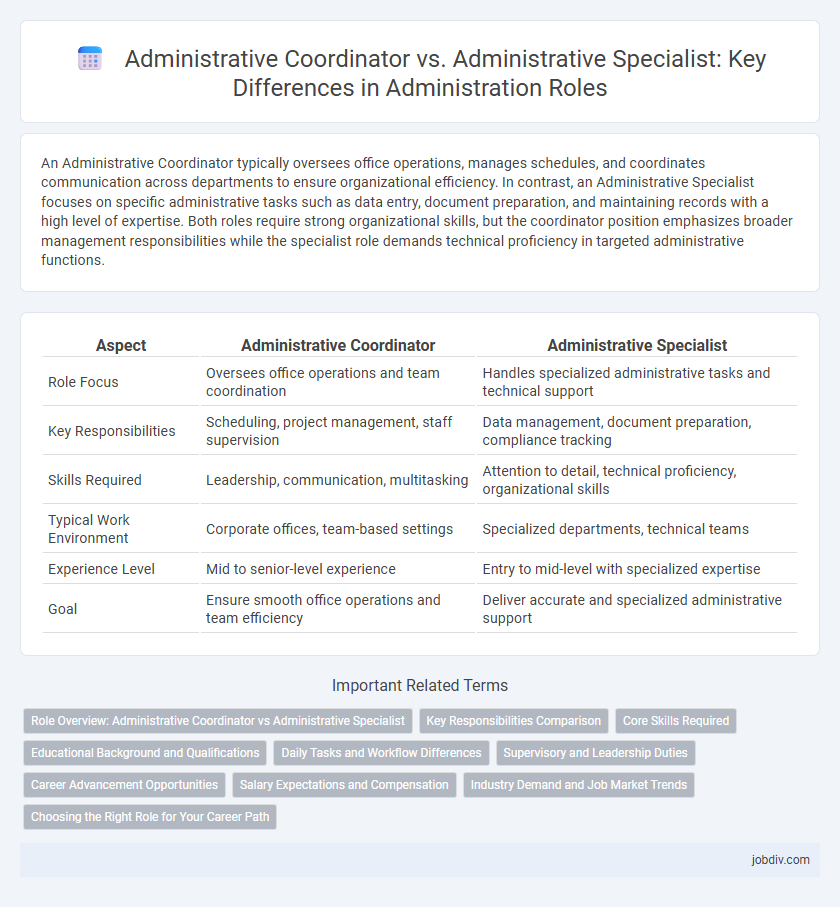An Administrative Coordinator typically oversees office operations, manages schedules, and coordinates communication across departments to ensure organizational efficiency. In contrast, an Administrative Specialist focuses on specific administrative tasks such as data entry, document preparation, and maintaining records with a high level of expertise. Both roles require strong organizational skills, but the coordinator position emphasizes broader management responsibilities while the specialist role demands technical proficiency in targeted administrative functions.
Table of Comparison
| Aspect | Administrative Coordinator | Administrative Specialist |
|---|---|---|
| Role Focus | Oversees office operations and team coordination | Handles specialized administrative tasks and technical support |
| Key Responsibilities | Scheduling, project management, staff supervision | Data management, document preparation, compliance tracking |
| Skills Required | Leadership, communication, multitasking | Attention to detail, technical proficiency, organizational skills |
| Typical Work Environment | Corporate offices, team-based settings | Specialized departments, technical teams |
| Experience Level | Mid to senior-level experience | Entry to mid-level with specialized expertise |
| Goal | Ensure smooth office operations and team efficiency | Deliver accurate and specialized administrative support |
Role Overview: Administrative Coordinator vs Administrative Specialist
An Administrative Coordinator manages office operations and oversees support staff to ensure efficient workflow, while an Administrative Specialist focuses on executing specialized tasks such as data management, scheduling, and document preparation. The Coordinator typically handles broader responsibilities involving team coordination and process improvement, whereas the Specialist provides expert support in specific administrative functions. Both roles are essential for organizational efficiency but differ in scope and focus within administrative operations.
Key Responsibilities Comparison
Administrative Coordinators oversee scheduling, office management, and coordination of team activities, ensuring smooth communication and workflow across departments. Administrative Specialists focus on executing specialized administrative tasks such as data management, record keeping, and supporting specific project needs with detailed accuracy. Both roles require strong organizational skills, but coordinators typically handle broader operational duties while specialists concentrate on domain-specific administrative functions.
Core Skills Required
Administrative Coordinators require strong organizational abilities, project management expertise, and excellent communication skills to effectively oversee office operations and coordinate team activities. Administrative Specialists focus on advanced technical skills such as data analysis, specialized software proficiency, and detailed record-keeping to support specific departmental needs. Both roles demand proficiency in scheduling, multitasking, and problem-solving to maintain smooth administrative workflows.
Educational Background and Qualifications
Administrative Coordinators typically possess a bachelor's degree in business administration, management, or a related field, emphasizing strong organizational and leadership skills. Administrative Specialists often hold an associate degree or relevant certifications, with expertise in specific administrative functions such as data management or communication. Both roles require proficiency in office software, but coordinators usually need advanced qualifications for overseeing teams and projects.
Daily Tasks and Workflow Differences
An Administrative Coordinator manages daily operations by organizing schedules, overseeing office logistics, and coordinating project workflows to ensure seamless communication across departments. In contrast, an Administrative Specialist focuses on executing detailed administrative tasks such as data entry, document preparation, and maintaining records with high accuracy. Workflow differences highlight the Coordinator's broader responsibility for team collaboration and process management, while the Specialist excels in handling specific, repetitive tasks requiring specialized expertise.
Supervisory and Leadership Duties
Administrative Coordinators often hold supervisory responsibilities, managing team schedules, delegating tasks, and ensuring operational efficiency within administrative departments. In contrast, Administrative Specialists typically focus on expert-level execution of specific administrative functions without direct leadership or staff management duties. Leadership duties in roles vary significantly, with Coordinators playing a pivotal role in team guidance, while Specialists contribute through specialized knowledge and support.
Career Advancement Opportunities
Administrative Coordinators often have broader responsibilities that include project management and team supervision, which can lead to higher-level roles like Office Manager or Operations Manager. Administrative Specialists typically develop deep expertise in specific administrative functions, positioning themselves for advancement into specialized roles such as Executive Assistant or Administrative Manager. Career advancement for both roles depends on gaining additional skills in leadership, communication, and technology to increase organizational impact and eligibility for senior administrative positions.
Salary Expectations and Compensation
Administrative Coordinators typically earn an average salary ranging from $45,000 to $60,000 annually, reflecting their broader scope of responsibilities in managing office operations and team coordination. Administrative Specialists often expect compensation between $40,000 and $55,000, emphasizing their focus on specialized administrative tasks and technical support. Salary variations depend on industry, experience, geographic location, and company size, with coordinators generally positioned for higher pay due to their leadership roles.
Industry Demand and Job Market Trends
The job market shows growing demand for Administrative Coordinators, especially in sectors like healthcare and education, due to their role in managing complex scheduling and team coordination. Administrative Specialists are increasingly valued in technology and finance industries for their expertise in data management and process optimization. Emerging trends indicate that proficiency in digital tools and cross-functional communication skills significantly enhances employability for both roles.
Choosing the Right Role for Your Career Path
Choosing between an Administrative Coordinator and an Administrative Specialist depends on your career goals and skill set. Administrative Coordinators typically manage office operations and team collaboration, making them ideal for those seeking leadership and organizational roles. Administrative Specialists focus on expertise in specific administrative functions, suited for professionals aiming to deepen technical skills and streamline specialized processes.
Administrative Coordinator vs Administrative Specialist Infographic

 jobdiv.com
jobdiv.com